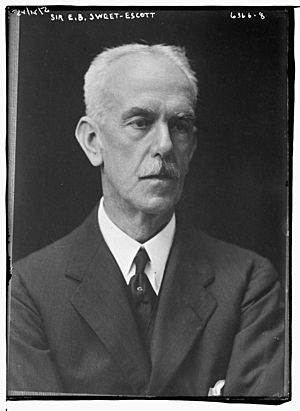Bickham Sweet-Escott facts for kids
Quick facts for kids
Bickham Sweet-Escott
|
|
|---|---|

Sweet-Escott in 1924
|
|
| 3rd Administrator of the Seychelles | |
| In office August 1899 – November 1903 |
|
| Preceded by | Henry Cockburn Stewart |
| Succeeded by | Himself (as Governor) |
| 1st Governor of the Seychelles | |
| In office November 1903 – 1904 |
|
| Monarch | Edward VII |
| Preceded by | Himself (as Administrator) |
| Succeeded by | Walter Edward Davidson |
| 4th Governor of British Honduras | |
| In office 15 April 1904 – 1906 |
|
| Monarch | Edward VII |
| Preceded by | David Wilson |
| Succeeded by | Eric John Eagles Swayne |
| 34th Governor of the Leeward Islands | |
| In office 1906–1912 |
|
| Preceded by | Clement Courtenay Knollys |
| Succeeded by | Henry Hesketh Bell |
| 9th High Commissioner for the Western Pacific | |
| In office 25 July 1912 – 10 October 1918 |
|
| Preceded by | Francis Henry May |
| Succeeded by | Cecil Hunter-Rodwell |
| 10th Governor of Fiji | |
| In office 25 July 1912 – 10 October 1918 |
|
| Preceded by | Francis Henry May |
| Succeeded by | Cecil Hunter-Rodwell |
| Personal details | |
| Born | 20 August 1857 Bath, Somerset, England |
| Died | 9 April 1941 (aged 83) Worthing, England |
| Spouses |
Mary Jane Hunt, Lady Sweet-Escott
(m. 1881) |
Sir Ernest Bickham Sweet-Escott (born August 20, 1857 – died April 9, 1941) was an important British official. He worked as a governor in several different parts of the world. These places included the British Seychelles, British Honduras, the British Leeward Islands, and British Fiji.
Contents
Who Was Sir Ernest Sweet-Escott?
Ernest Bickham Sweet-Escott was born in Bath, Somerset, England. He was the fifth son of Rev. Hay Sweet-Escott, who was a headmaster and a church leader.
Ernest went to school at Royal Somersetshire College and Bromsgrove School. He also studied at Balliol College, Oxford, a famous university. In 1881, he became a professor of classics (ancient Greek and Roman studies) in Mauritius.
His Early Career
In 1886, Sweet-Escott started working for the government in Mauritius. He became an assistant colonial secretary. This job meant he helped manage the British territory.
Later, in 1889, he was promoted to acting colonial secretary. From 1893 to 1898, he worked in British Honduras. After that, he briefly worked in London at the Colonial Office.
A Career as a Governor
Sweet-Escott became an administrator in the Seychelles in 1899. The Seychelles are a group of islands in the Indian Ocean. In 1903, he became the first official Governor of the Seychelles. He held this role until 1904.
In 1904, he was given the title "Sir" for his important work. He then became the Governor of British Honduras. He served there from 1904 to 1906. From 1906 to 1912, he was the Governor of the Leeward Islands. These islands are in the Caribbean Sea.
Governing Fiji and the Pacific
On July 25, 1912, Sir Ernest Sweet-Escott became the Governor of Fiji. Fiji is a country made up of islands in the Pacific Ocean. He also became the High Commissioner for the Western Pacific region. This meant he was in charge of many British interests across the Pacific.
During World War I, a German warship group was sailing near Fiji. Sir Ernest sent a message to the Australian fleet. The Germans intercepted this message. They thought it was a trick and turned away. This helped protect Fiji from attack. His time as governor ended on October 10, 1918.
Other Interesting Facts
Sir Ernest Sweet-Escott helped start the Escott Shield in 1913. This is a rugby trophy in Fiji. The Pacific Club was the first team to win it.
He married Mary Jane Hunt in 1881. They had five children together. Sir Ernest was recognized for his service with important awards. These included the Order of St Michael and St George.

